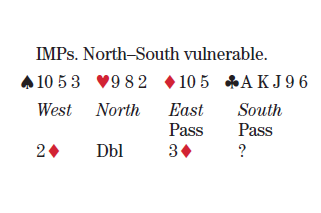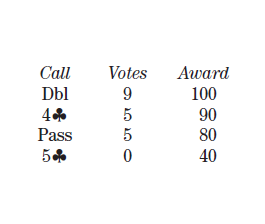
What’s your call?
| 3♥ | 3♠ | 3NT | ||
| 4♣ | 4♦ | 4♥ | 4♠ | 4NT |
| 5♣ | 5♦ | 5♥ | 5♠ | 5NT |
| 6♣ | 6♦ | 6♥ | 6♠ | 6NT |
| 7♣ | 7♦ | 7♥ | 7♠ | 7NT |
| Dbl | Pass |
This common hand headache generated another three-way split among the panelists. Whatever the description — takeout, responsive or valueshowing — double is perhaps the most flexible call.
“Partner could have 5–4 in the majors, and double allows us to find our 5–3 fit. Also it is possible that we could wind up defending,” says Sanborn.
Another doubler is Meyers, who is “torn between doubling (denying a four-card major and showing values) and passing.”
Cohen doubles, but he’s unhappy. “Ugh. I am not thrilled at all, as we are likely to land in a 4–3 major-suit fit. But I don’t want to forfeit plus-600 opposite, say:
♠A J x x ♥A K x x ♦K x ♣Q x x.
I am likely turning a small plus into a small minus, but I can’t resist trying for the vulnerable game bonus.”
Lawrence doubles, too, “takeout — ostensibly for the majors. This rates to get us to a 4–3 fit. The opponents’ quiet bidding suggests they have only nine diamonds, so getting to 4♣ could be wrong. If partner bids four of a major, it may make if he has a good suit. There are some maybes here. Passing bothers me since the hand could belong to us.”
There are no maybes for Rigal, who doubles, “but with the emphasis that partner passes with a balanced hand and acts with shape. I’m certainly prepared to believe that our least worst result may come from defending 3♦ undoubled, but I can’t stand to pass when I know it’s our hand.”
The Coopers also double, calling the hand too good to pass “and 4♣ too committal with only five of them.”
Stack bids 4♣ without a care. “Partner has made a takeout double and we have all the requirements to bid: good values and a good five-card suit. Bidding what is right under our nose is seldom a bad thing.”
A responsive double is likely to “lead to trouble” most of the time, according to the Sutherlins and the other 4♣ adherents. “We need to show some life.”
Falk says he doesn’t see how a responsive double solves getting to 3NT. “Partner surely has at least one four-card major and will bid it, and then I’ll have to bid 4♣ anyway. Also, even if partner has a diamond stopper, there’s nothing to say we can take nine tricks without giving up the lead. I’m probably worth only ‘pass’ here, but if partner has a singleton diamond, even with our major suit finesses losing, there’s probably good play for 11 tricks in clubs if partner raises to game.”
Boehm bids a direct 4♣, eschewing a double followed by 4♣ over partner’s expected major-suit takeout because that sequence would sound like he is offering two places to play.
The Joyces recognize that while 4♣ “is not an ideal bid, it is at least lead-directing if the opponents bid more.”
The panelists who choose to pass need partner to do something over 3♦ before they’ll show signs of life.
“If partner can’t bid again, we should do well defending 3♦,” says Robinson. “The third-seat 2♦ bidder could have lots of strength. Passing will not stop us from getting to game.”
The Gordons evaluate: “We are tempted to double responsively, but since we don’t want to bid 4♣ over partner’s major, we will pass and await developments, if any.”
Weinstein, too, says that while he considers the hand to be very close to a responsive double, “I just don’t think I am quite worth it. If we have a game, partner will rate to be able to come back doubling, and then I can cuebid 4♦.”

